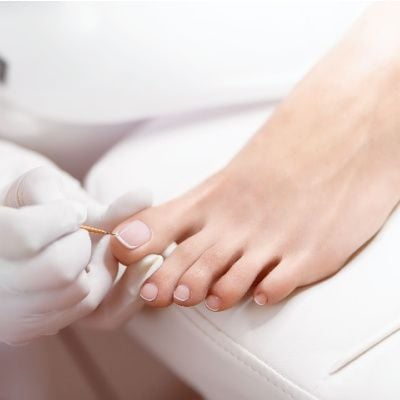 Pedicures, often associated with pampering and aesthetics, offer more than just a cosmetic makeover for your feet. Beyond the indulgence of polished nails and soft skin, regular pedicures provide a range of health benefits that contribute to overall foot wellness. In this exploration, we unravel pedicures' surprising advantages, emphasizing the importance of incorporating these foot care rituals into your self-care routine.
Pedicures, often associated with pampering and aesthetics, offer more than just a cosmetic makeover for your feet. Beyond the indulgence of polished nails and soft skin, regular pedicures provide a range of health benefits that contribute to overall foot wellness. In this exploration, we unravel pedicures' surprising advantages, emphasizing the importance of incorporating these foot care rituals into your self-care routine.
Enhanced Nail Health
At the core of any pedicure is nail care. Trimming, shaping, and cleaning the toenails improve their appearance and contribute to overall nail health. Regular maintenance helps prevent ingrown toenails, fungal infections, and other issues from neglecting proper nail care.
Callus and Corn Prevention
The formation of calluses and corns, often due to friction and pressure on the feet, can be effectively managed through pedicures. The gentle removal of dead skin during the exfoliation process helps prevent the build-up of these rough patches, promoting smoother, more comfortable feet.
Improved Circulation
The massage component of a pedicure is more than just a relaxing experience. It stimulates blood circulation in the feet, aiding in delivering oxygen and nutrients to the tissues. Enhanced circulation contributes to reduced swelling, faster healing, and an overall sense of foot vitality.
Stress Relief and Relaxation
Beyond the physical benefits, the relaxation achieved during a pedicure has notable mental health advantages. The calming effects of the massage, warm water soak, and overall pampering contribute to stress reduction and improved mental well-being.
Early Detection of Foot Issues
Regular pedicures involve a close inspection of the feet by a trained professional. This allows for the early detection of potential issues such as fungal infections, warts, or other abnormalities. Timely identification enables proactive measures, preventing the escalation of minor concerns into more significant problems.
Moisturization and Hydration
The skin on our feet is susceptible to dryness and cracking, especially in areas with less natural moisture. Pedicures involve moisturization and hydration techniques that address these concerns, leaving the skin soft and supple. Well-hydrated skin is more resistant to issues like fissures and infections.
Stress on Joints and Muscles
A pedicure's massaging and soaking components relieve tired and achy muscles. This is particularly beneficial for individuals who spend prolonged periods on their feet. By alleviating tension and stress on joints and muscles, pedicures contribute to enhanced mobility and comfort.
Choosing the Right Pedicure
Choosing the right type for your needs is essential to maximize the health benefits of pedicures. Basic pedicures, spa pedicures, and medical pedicures cater to different requirements, with the latter often addressing specific foot health issues under the guidance of a podiatrist.
Conclusion
In conclusion, pedicures offer a holistic approach to foot care, combining aesthetic enhancements with many health benefits. Beyond the visual appeal, these treatments contribute to nail health, circulation, stress relief, and early issue detection. Integrating regular pedicures into your self-care routine is a proactive step towards maintaining happy, healthy feet that support your overall well-being. So, the next time you consider a pedicure, remember that you're not just treating your feet to a beauty makeover – you're investing in their long-term health and vitality.
Disclaimer:
The information on this website is provided for educational and information purposes only and is not medical advice. Always consult with a licensed medical provider and follow their recommendations regardless of what you read on this website. If you think you are having a medical emergency, dial 911 or go to the nearest emergency room. Links to other third-party websites are provided for your convenience only. If you decide to access any of the third-party websites, you do so entirely at your own risk and subject to the terms of use for those websites. Neither Evanston Foot and Ankle Clinic, nor any contributor to this website, makes any representation, express or implied, regarding the information provided on this website or any information you may access on a third-party website using a link. Use of this website does not establish a doctor-patient relationship. If you would like to request an appointment with a health care provider, please call our office at (847) 864-5010.


